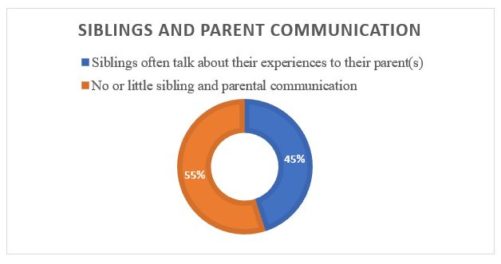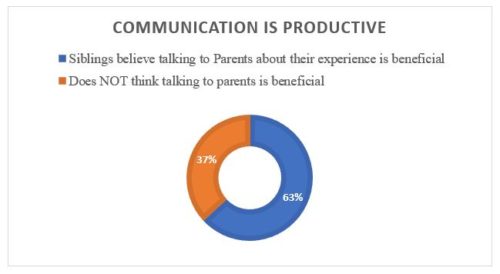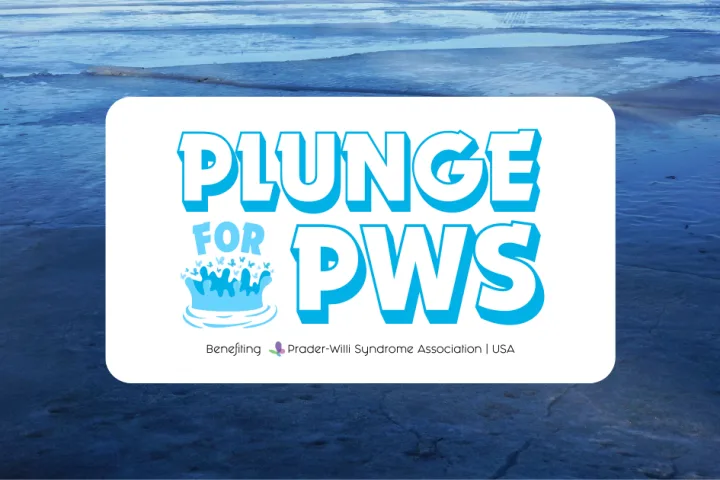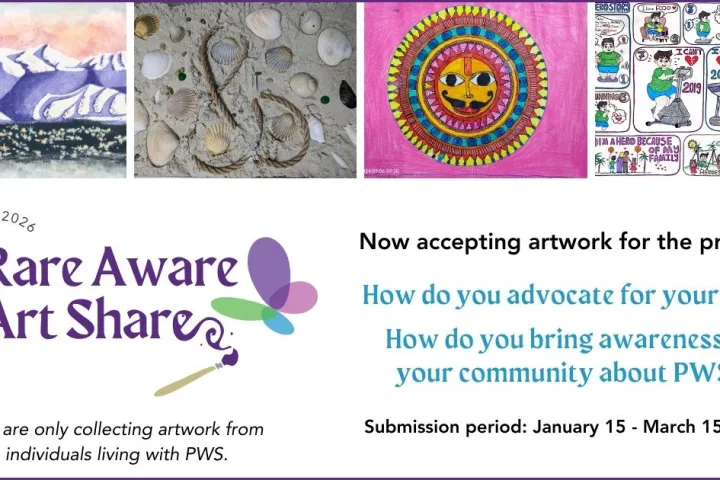Communication is key in any family and is especially important in a family impacted by Prader-Willi syndrome (PWS). Experts believe that open, clear, and frequent communication is necessary for healthy family functioning (Green & Peterson, 2019).
Research shows that most parents have sparse conversations with their children about what it is like to grow up as a sibling to an individual with PWS (Murphy, Thornton & Thornton, 2019). 
However, 65% of siblings believe that talking often with their parents about their experiences, feelings and difficulties of the syndrome is beneficial. When interviewed, most siblings explicitly said they wished their parents would initiate conversations, talk with them, and listen to what they have to say about what they are experiencing (Murphy, Thornton & Thornton, 2019).
When a child with PWS has a tantrum or is aggressive, siblings often cannot attribute their feelings and reactions to that event. As one sibling said, “After a tantrum I will go into my room and I am anxious, and I don’t know why”. Children also often struggle to identify which emotions they are feeling. This can make the negative feelings more difficult to eliminate and can contribute to emotional and psychological issues (Murphy, Thornton & Thornton, 2019).
Often, parents will move forward after a difficult moment with their child with PWS without addressing the situation or the emotions felt by themselves or siblings. This can leave siblings with intense stress and negative emotions, as well as uncertainly as to why they are having these feelings and what to do with them. When parents acknowledge that a situation was difficult and express the emotions they felt during an ordeal, it allows siblings to attribute the feelings with the situation as well as mirrors healthy sharing and ventilation which can lessen the negative impact.
Research shows that siblings of those with PWS often feel distant from their friends and other social supports because they cannot find support or empathy in these relationships. This deficit likely stems from the inability to perceive and understand what is happening with siblings emotionally (Murphy, Thornton & Thornton, 2019).
Tips for Improving Communication
- Initiate conversations with siblings. Check in with them about their lives and about all aspects of living with a sibling with PWS such as tantrums, locked food, tending, and how it impacts their social and educational environments. Let siblings give feedback on how things are going and make changes accordingly.
- Schedule times to talk with each sibling. On a regular basis, perhaps once a week or at least once a month, sit down with each sibling individually to check in with them. Assess how they are doing living with PWS and adjust what you are doing based on siblings’ responses. For example, if they are struggling, give siblings more attention and less responsibilities. This will let siblings know that you hear and care about how they are doing as well as increase their psychosocial well-being.
- Continually check in. Communicate frequently with siblings about how they are doing. This should happen daily. It does not need to be a formal sit down, just a quick check in.
- Listen to what siblings say. Listen actively and non-judgmentally. Make sure siblings feel comfortable telling you about their experiences. Allow siblings to express negative emotions even if they are towards you or their siblings with PWS. It is okay for siblings to dislike their family member with PWS or disagree with how you handled a situation. Do not be defensive and argue your side. Just listen to what they are saying. Never dismiss sibling’s feelings. All feelings are valid.
- Let siblings vent. Often siblings just need someone to listen and validate their feelings. Do not always try to fix the situation, just listen. Try to have siblings tell you when they need to vent instead of having a discussion.
- Tell siblings what they are doing well.
- Create an environment for open sharing. Make sure you model open communication by honestly sharing your feelings and how PWS impacts you.
- Practice debriefing. After stressful and difficult times, sit down together and practice debriefing (refer to previous article, “Tips for Improving the Well-being of Siblings of Individuals with Prader-Willi Syndrome: Debriefing” found at: https://www.pwsausa.org/tips-for-improving-the-well-being-of-siblings-of-individuals-with-prader-willi-syndrome-debriefing/).
- Get professional help. Being a sibling to someone with PWS puts individuals at risk for emotional and psychological issues. Therefore, every sibling should receive professional mental health services.
Helpful link for finding professional help: www.psychologytoday.com
Contributed by Jane Thornton
References
Peterson, R., Green, S. (2009). Family-First Keys to Successful Family Functioning: Communication. Virginia Cooperative Extension. https://www.pubs.ext.vt.edu/350/350- 092/350- 092.html#:~:text=092.html#:~:text=Communication%20within%20the%20family%20is, and%20admiration%20for%20one%20another.
Murphy, L., Thornton, J., Thornton, E. (2019). Tips for Supporting Parents. Prader-Willi Syndrome Association (USA). Retrieved from: https://ww.pwsausa.org/2019convention handouts/






 Perry A. Zirkel has written more than 1,500 publications on various aspects of school law, with an emphasis on legal issues in special education. He writes a regular column for NAESP’s Principal magazine and NASP’s Communiqué newsletter, and he did so previously for Phi Delta Kappan and Teaching Exceptional Children.
Perry A. Zirkel has written more than 1,500 publications on various aspects of school law, with an emphasis on legal issues in special education. He writes a regular column for NAESP’s Principal magazine and NASP’s Communiqué newsletter, and he did so previously for Phi Delta Kappan and Teaching Exceptional Children. Jennifer Bolander has been serving as a Special Education Specialist for PWSA (USA) since October of 2015. She is a graduate of John Carroll University and lives in Ohio with her husband Brad and daughters Kate (17), and Sophia (13) who was born with PWS.
Jennifer Bolander has been serving as a Special Education Specialist for PWSA (USA) since October of 2015. She is a graduate of John Carroll University and lives in Ohio with her husband Brad and daughters Kate (17), and Sophia (13) who was born with PWS. Dr. Amy McTighe is the PWS Program Manager and Inpatient Teacher at the Center for Prader-Willi Syndrome at the Children’s Institute of Pittsburgh. She graduated from Duquesne University receiving her Bachelor’s and Master’s degree in Education with a focus on elementary education, special education, and language arts.
Dr. Amy McTighe is the PWS Program Manager and Inpatient Teacher at the Center for Prader-Willi Syndrome at the Children’s Institute of Pittsburgh. She graduated from Duquesne University receiving her Bachelor’s and Master’s degree in Education with a focus on elementary education, special education, and language arts. Evan has worked with the Prader-Willi Syndrome Association (USA) since 2007 primarily as a Crisis Intervention and Family Support Counselor. Evans works with parents and schools to foster strong collaborative relationships and appropriate educational environments for students with PWS.
Evan has worked with the Prader-Willi Syndrome Association (USA) since 2007 primarily as a Crisis Intervention and Family Support Counselor. Evans works with parents and schools to foster strong collaborative relationships and appropriate educational environments for students with PWS. Staci Zimmerman works for Prader-Willi Syndrome Association of Colorado as an Individualized Education Program (IEP) consultant. Staci collaborates with the PWS multi-disciplinary clinic at the Children’s Hospital in Denver supporting families and school districts around the United States with their child’s Individual Educational Plan.
Staci Zimmerman works for Prader-Willi Syndrome Association of Colorado as an Individualized Education Program (IEP) consultant. Staci collaborates with the PWS multi-disciplinary clinic at the Children’s Hospital in Denver supporting families and school districts around the United States with their child’s Individual Educational Plan. Founded in 2001, SDLC is a non-profit legal services organization dedicated to protecting and advancing the legal rights of people with disabilities throughout the South. It partners with the Southern Poverty Law Center, Protection and Advocacy (P&A) programs, Legal Services Corporations (LSC) and disability organizations on major, systemic disability rights issues involving the Individuals with Disabilities Education Act (IDEA), Americans with Disabilities Act (ADA), and the federal Medicaid Act. Recently in November 2014, Jim retired.
Founded in 2001, SDLC is a non-profit legal services organization dedicated to protecting and advancing the legal rights of people with disabilities throughout the South. It partners with the Southern Poverty Law Center, Protection and Advocacy (P&A) programs, Legal Services Corporations (LSC) and disability organizations on major, systemic disability rights issues involving the Individuals with Disabilities Education Act (IDEA), Americans with Disabilities Act (ADA), and the federal Medicaid Act. Recently in November 2014, Jim retired.